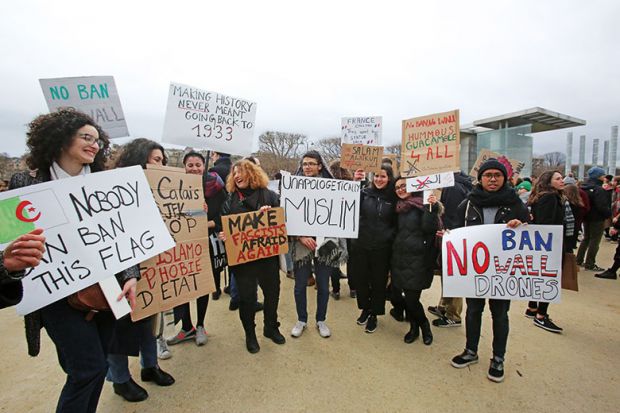After the election of Donald Trump as US president in November, art student Usman Anwar painted a work he called “Freedom”, depicting an angel covering her eyes with her wings.
Now he knows how she feels.
A Pakistani who has a student visa, he returned from the midwinter break at Adelphi University near New York on the day before Mr Trump proposed a ban on travel from seven predominantly Muslim countries. Already, he said, the immigration process was stricter than before.
“They were questioning us more, lining us up, separating out the students,” Mr Anwar said. “I was not sure what was happening.”
Now, even though the travel ban has been repeatedly blocked by federal judges, and even though Pakistan was never on the list, Mr Anwar is among many international students who have elected to stay in the US for the summer out of fear that, if they leave, they won’t be allowed back in.
If he goes home, “I feel like I’m going to put my education at risk”, said Mr Anwar.
International students seldom stay at American universities during the long summer break between academic semesters, which runs from May until the end of August. Few universities are equipped to accommodate them if they do.
But this summer, several have not only made room for international students to remain; they have found them jobs and raised money to help them cover expenses over the summer.
Mr Anwar, for instance – the youngest of four children – said that his father hadn’t budgeted for him to live in the US through the summer. Adelphi let him stay, gave him a job as a graphic designer and set aside a pool of money to help him and other international students. A crowdfunding campaign provided additional support.
“With the rhetoric coming out of the White House, students just have no clue what could happen,” said Wendy Badala, director of international student services at Adelphi and also of the university’s Interfaith Center. “There is a nervousness and anxiety that these students and their families have, and as a university we wanted to make sure that we put them at ease.”
With higher education in its quiet season, the unusual presence of international students on campuses in the summer is a reminder of the huge stakes of Mr Trump’s contentious immigration policy.
Announced in January, Mr Trump’s order would have imposed a 90-day halt on issuing travel visas to citizens of Iran, Iraq, Libya, Somalia, Sudan, Syria and Yemen. It was almost immediately blocked by a federal judge, but has since been allowed by the Supreme Court, with Iraq removed from the list and individuals with a “credible claim of a bona fide relationship with a person or entity in the United States” excluded.
The confusion has only made things worse for international students, according to university officials.
“It’s really hard to advise students when we just don’t know what might happen,” Ms Badala said. “That’s the trouble with this administration. Things could change in an hour, and we don’t know.”
Among other institutions to provide assistance to international students, Lawrence University in Wisconsin offered summer housing and jobs to those who wanted to stay, and about 20 of them have. Since the dining halls are closed for the summer, it is providing shuttle buses to supermarkets; if students cancelled airline tickets, the university gave them housing credits equal to any penalties they paid.
Like Mr Anwar, none of the students who have stayed at Lawrence come from countries affected by the travel ban. But they're worried anyway, said Leah McSorley, director of international student services there.
“They basically don’t want to risk being outside the country,” she said. Students tell her: “Our parents are investing tens of thousands of dollars each year, and I’m halfway through my programme. What happens to me if I go home and then I’m not allowed back in? What happens to my degree?”
Ithaca College in New York invited students from countries subject to the travel ban to stay for free, although they have to pay for their meals. Several from other countries asked too, and were given housing.
Anxiety like this will have a long reach, said Mr Anwar, back at Adelphi.
“The United States of America is a land of opportunity. Everyone wants to come here to study,” he said. “But eventually people who can afford other places, maybe with these politics, they won’t want to send their kids here even if their kids want to come.”
POSTSCRIPT:
Print headline: Summer staycation for foreign students afraid to leave US
Register to continue
Why register?
- Registration is free and only takes a moment
- Once registered, you can read 3 articles a month
- Sign up for our newsletter
Subscribe
Or subscribe for unlimited access to:
- Unlimited access to news, views, insights & reviews
- Digital editions
- Digital access to THE’s university and college rankings analysis
Already registered or a current subscriber? Login








